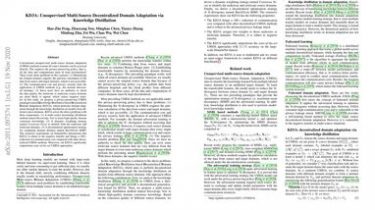KD3A: Unsupervised Multi-Source Decentralized Domain Adaptation via Knowledge Distillation

Conventional unsupervised multi-source domain adaptation(UMDA) methods assume all source domains can be accessed directly. This neglects the privacy-preserving policy, that is,all the data and computations must be kept decentralized.There exists three problems in this scenario: (1)Minimizing the domain distance requires the pairwise calculation of the data from source and target domains, which is not accessible...
(2)The communication cost and privacy security limit the application of UMDA methods (e.g.,the domain adversarial training). (3)Since users have no authority to checkthe data quality, the irrelevant or malicious source domainsare more likely to appear, which causes negative transfer. In this